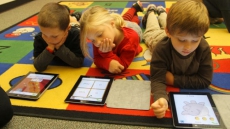Children who are bilingual can be better and faster at learning additional languages later in life than their peers who are monolinguals from their early childhood, researchers say.
The findings showed significant difference in language learners' brain patterns.
When learning a new language, bilinguals rely more than monolinguals on the brain processes that people naturally use for their native language, the researchers said.
"We also find that bilinguals appear to learn the new language more quickly than monolinguals," said lead author Sarah Grey, assistant professor at the Fordham University in New York City.
For the study, published in the journal Bilingualism: Language and Cognition, the team enrolled college students who grew up in the US with Mandarin-speaking parents, and learned both English and Mandarin at an early age.
They were matched with monolingual college students, who spoke only English.
The researchers studied Mandarin-English bilinguals because both of these languages differ structurally from the new language being learned.
Both groups learnt to both speak and understand an artificial version of a Romance language, Brocanto.
The researchers found clear bilingual or monolingual differences. By the end of the first day of training, the bilingual brains, but not the monolingual brains, showed a specific brain-wave pattern, termed the P600 -- commonly found when native speakers process their language.
In contrast, the monolinguals only began to exhibit P600 effects much later during learning -- by the last day of training.
Moreover, on the last day, the monolinguals showed an additional brain-wave pattern not usually found in native speakers of languages.
"There has been a lot of debate about the value of early bilingual language education. Now, we have novel brain-based data that points towards a distinct language-learning benefit for people who grow up bilingual," added Michael T. Ullman, professor at the Georgetown University in the US.






